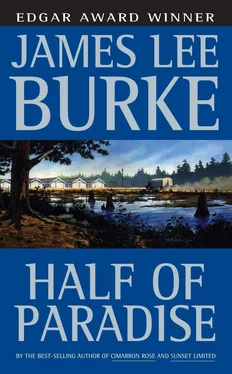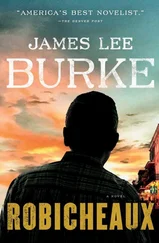The truck stopped and Avery climbed down and thanked the old man. He started down the lane through the wood gate towards the house. The gate swung back on its hinges over the cattle guard and clacked against the fence post. He could see his father standing on the veranda looking out over the barren fields in front of the house. Mr. Broussard wore the same black trousers and coat he always wore when he wasn’t in the fields. His thin hair was steel-gray, and the red veins in his cheeks showed through his gray whiskers, and he had on a wide-brimmed planter’s hat that was slanted over his eyes. Batiste was sawing logs and putting them in a cord by the side of the house. The house was built in French colonial style with red bricks covering the bottom half of the building, and a balcony ran completely around the second story. The banisters on the veranda were broken, and the paint was cracked and peeling, the roof sagged in places, and the outbuildings had weathered gray. To one side of the house there was a pecan orchard, the trees barren and twisted like broken fingers held in the air.
“Hello, son,” Mr. Broussard said. “Hi, Papa.”
“I’m glad you came home.”
Avery looked about him and felt the emptiness of his home press in upon him.
“Did you quit your job?” Mr. Broussard said.
“Yes, sir.”
“Batiste said you would come home. All the time you were away he said you would be back. It’s been a little hard since you’ve been gone.”
Why does he have to talk like that? Avery thought.
“Aren’t you planting this year?” Avery said.
“I have to get some money from the bank.”
“The oil company owes me some in back pay. They’ll send it in a couple of weeks.”
“That’s fine, son. Maybe we’ll have a good year.”
Batiste came over and shook hands with Avery. His hair had begun to turn white, and his shoulders were bent; he wore suspenders and a collarless shirt, and the leather was cut away from the toe of one of his shoes.
“He’s looking fine, ain’t he, Mr. Broussard?” he said.
“How’ve you been?” Avery said.
“Been waiting for you to come home. I didn’t have nobody to go hunting with.”
“We’ll go frogging tonight.”
“I reckon you grown into a man,” Batiste said. He was smiling with his hands on his sides.
“He looks older,” Mr. Broussard said.
Avery felt embarrassed.
“Yes sir, you grown into a man,” Batiste said. “It’s sure good to have you back. I ain’t had no fun hunting by myself.”
“We’ll get plenty of honkers this year,” Avery said. “Going to fix the blind up so we’ll be ready for them in the fall.”
Avery remembered when he and his father used to go hunting together. They would get up early in the morning and put on their waders and quilted hunting jackets. They used the outboard to cross the mouth of the river, and Avery would sit on the bow, letting the cold spray sting his face, and listen to the gulls that cry over the water before dawn. They would stand waist-deep in the freezing water, waiting for the ducks as they flew over the willow trees to feed in the rice field, then fire when the lead ducks dropped through the mist to land, he with the pump and his father with the double-barrel. The ducks would fold and fall heavily through the air, making a loud crack and splash when they broke through the thin sheet of ice. Avery would keep firing until his gun clicked empty, pumping the smoking shells into the water. The dogs would bark and jump off the levee into the reeds and swim towards the fallen birds. Then his father would break the double-barrel and wink at him as the empty shells plopped into the water. Keep shooting like that and we won’t have any birds for next season, he would say. They would wade to the levee and sit on the bank, drinking black coffee from thermos jugs, and listen to the geese honking in the marsh.
But that was then and not now. Mr. Broussard didn’t hunt anymore, and the double-barrel stayed over the fireplace. After his father quit hunting Avery went with Batiste, but it wasn’t the same.
“We’d better go in and have supper,” Mr. Broussard said.
“I’ll carry your duffle for you,” Batiste said.
Inside, Mr. Broussard and Avery ate at the kitchen table, which was covered with a red-and-white checkered oilcloth.
“How much do we owe the bank?” Avery said.
“There’s no need for you to worry about it, son.”
Why does he have to speak to me like that?
“How much is it?”
“Three hundred dollars,” he said.
“We can take another mortgage,” Avery said.
“Yes, we might be able to.”
“What do you say it like that for?”
“I’ll go see them about the mortgage tomorrow.”
“There’s something else, isn’t there?”
“I couldn’t meet the land taxes this year. The farm will go up at the sheriff’s tax sale unless I pay them soon.”
“My check from the company will pay the taxes.”
“It’s good of you to offer the money, but you know I didn’t approve of you taking that job.”
“Yes, sir.”
“There are all manner of men on those oil crews. You should always seek your own level in associating with people.”
“Yes, sir.”
“Those men are from a different background than you.”
“What difference does it make?” Avery said, and then wished he hadn’t.
“When you associate with people of a lower social class as an equal, they bring you down to their level. You don’t bring them up to yours.”
“All right, Papa.”
“I let you take the job because you were old enough to make decisions for yourself, but I never approved of it.”
“I’m not on the job any longer.”
“I know that, but you must always seek out your equals.”
“All right. I’m not going to work on any more crews.”
“I wanted to go to sea when I was a young boy, and my father wouldn’t allow me to. At the time I thought he was wrong, but as I got older I realized that he had done the right thing.”
“Let’s finish dinner, Papa.”
“Why did you take that job to begin with?”
“I thought I might like working on the water.”
“Try to understand, son. I’m not attempting to keep you at home. You can get a job in town or go to the college if you like. But you should do something suited to your background.”
“I’ll help with the farm this summer.”
“Would you like to go to the college? I had hoped you would.”
“Maybe next year.”
“There’s something else I’d like to talk with you about. When you unpacked your clothes I thought I saw a bottle. Are you still drinking?”
“Not too much. Just once in a while.”
“You’re older now and you make your own decisions, but I don’t like to see you drinking,” Mr. Broussard said. “It killed your grandfather.”
“I’m all right.”
“Maybe it’s in your blood. They say the odd generation gets it. Henri started drinking early, too.”
“A friend of mine left the bottle with me.”
“I hope I haven’t raised you wrong. I brought you up the same way I was brought up. That’s the only way I knew.”
Avery began to wish he hadn’t come home.
“I leave it alone now. I haven’t been tight since I went to work.”
“I want to believe that’s true.”
Avery felt guilty for lying, but he had learned long ago that it was better to tell his father certain things, whether they were true or not.
“You know how disappointed I was in you the night the sheriff had to bring you home from that bar,” Mr. Broussard said.
“That was a long time ago, Papa. Let’s don’t talk about it.”
“He had to carry you up the front steps.”
Читать дальше












